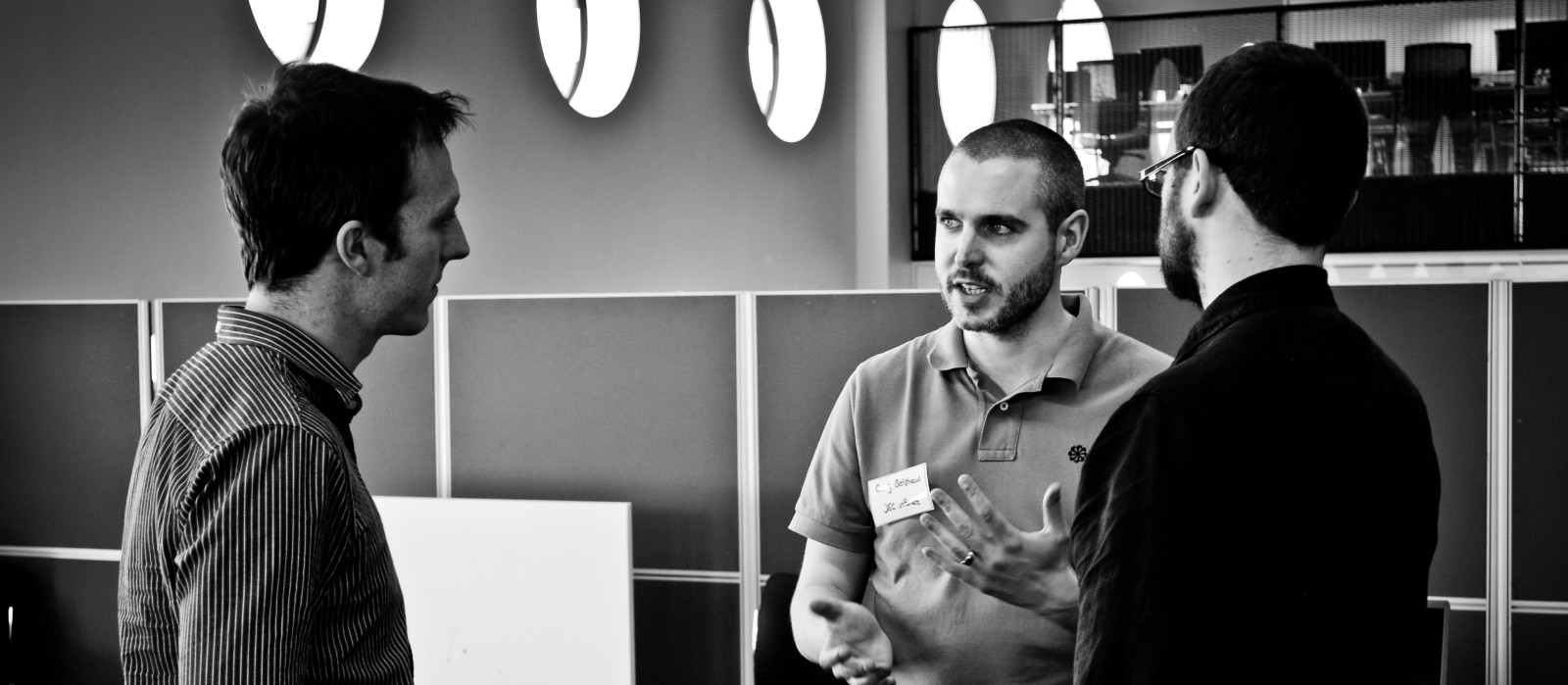An Unreasonable Man writes his Damn Book
The above image* was taken by Ian Usher at a co-design event just before I joined Mozilla in May 2012. It shows me in conversation with Oliver Quinlan (left) and John Bevan (right) both of whom are now at Nesta.
* Apologies for those reading this by email, you’ll need to click through!)
About Oliver’s book
Oliver’s written a book called The Thinking Teacher which I began reading this week. It’s a really clear and well thought-out approach for those who want to take a step back and think what it is that we’re actually doing when teaching others. For a limited time his book’s on special offer via Kindle for the bargain price of 99p. You should buy it.
Here’s a few things that I’ve highlighted already:
There are few other careers than teaching where everyone entering already has thirteen years of experience in the workplace.
Great observation. This is why (some) parents seem to think it’s OK to tell you how to do your job – and why edtech entrepreneurs think they know how to ‘fix education’. Of course, spending time somewhere as a ‘consumer’ is not the same as working there. It’s an imperfect analogy, but anyone who’s ever worked in a shop that they’ve also bought things from will know the difference between front and back of store.
If we are in the business of teaching and learning we have to believe that most things are learnable. All things being equal, it is possible to make significant changes in yourself and to learn. Of course, many things are situational: I am never going to be an Olympic gymnast – I am too old and my body is past it already. However, with enough time, dedication and practice I could certainly learn some gymnastic skills and improve.
I think the important insight here is that you don’t have to have the capacity to be the best in the world at something to derive use and satisfaction from getting better at it. Our world all too often tells us differently and it’s up to us as educators to push back on the holistic value of learning.
The reasonable man adapts himself to the world: the unreasonable one persists in trying to adapt the world to himself. Therefore all progress depends on the unreasonable man. (George Bernard Shaw)
Although I’ve heard this paraphrased before, I never knew it was a quotation from George Bernard Shaw until Oliver used it to introduce one of his sections! Such a great and widely-applicable way of looking at the world.
Great teachers are immersed in their field, not as a syllabus but as a changing, developing entity, with new areas to discover and new questions to ask.
This is one of the things I miss about teaching. My field was History, but even that was an ever-changing landscape based on discoveries (‘out there’ and my own) as well as different intepretations and ways of visualising the past. We can apply this mindset to any area, though – for example I’m trying to ask new questions about what it means to be ‘literate’ on the web.
You should definitely snap up Oliver’s book while it’s on special offer. I’m looking forward to reading the rest of it! Check out his blog and Twitter account too. 🙂
About YOUR book
Great though Oliver’s book is, my main point in writing this post is to encourage you to Write Your Damn Book. That’s the name of a course I received via email over the past year from Paul Jarvis. He’s now ended it – packaging everything up and making it available as a free PDF (5.2MB)**
You should write your book this year. Seriously. People are waiting to hear your unique take on life. They want to find out more: what do you wake up every day thinking about? For those of you who blog regularly, why not select your best posts and self-publish? Curate your stuff and put it out there for people to read! Books help you reach out of your echo chamber.
You can create a book using your favourite word processing software, export it to PDF and sell it on Gumroad. Or do as I’m doing for the two books I’m writing this year and try out Leanpub as a total solution. If you want a physical copy, I’ve had success using Lulu. There’s something about having a physical copy in your hands but, either way, it’s the intentional curation that counts.
You know, I bought myself a cheap bit of wall art before Christmas. It’s ironic given the title of Oliver’s book, as it says THINK LESS. DO MORE. Some of us need to do less doing and more thinking. But for me, my motto for 2015 revolves around less thinking and more doing. What’s yours?
** If that link doesn’t work, try this one (archive.org)!


